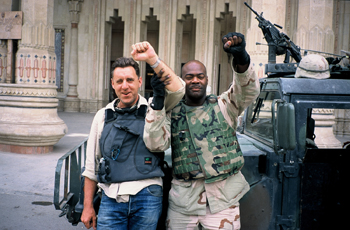![[Metroactive Movies]](/movies/gifs/movies468.gif)
[ Movies Index | Show Times | Silicon Valley | Metroactive Home | Archives ]

Solidarity: The U.S. soldiers of 'Gunner Palace' salute the camera. Sand Castle Documentary 'Gunner Palace' tracks the fear and boring of U.S. troops in Iraq WHITE SOLDIERS play the guitar; black soldiers use rap to describe what they see in Occupied Iraq. In the documentary Gunner Palace, one soldier-poet describes his job, saying, "You don't have to like it/ please respect it." That's easy enough. Certainly, director Michael Tucker risked his own hide to film the 2-3 Field Artillery during the second half of 2003. The unit was stationed in Uday Hussein's half-bombed Azimiya Palace. The broken-down palace looks for all the world like a half-demolished, Moorish-flavored movie theater of the 1920s. In the back, it has a clean swimming pool, a stocked fishing pond and a small makeshift putting green. The palace is near the biggest Sunni mosque in Baghdad. From this fortified cavern, American soldiers go forth to patrol the streets, break down doors and continue their hunt for Saddam Hussein. They sometimes find caches of money and weapons, and they round up insurgents and ship them off to Abu Ghraib—no comment by Tucker about what happened then. For all the stress, these soldiers are young, open-faced and not dead in the eyes. You can see, for instance, why interviewee SPC Bette Grimes was picked for the cover of Time. She's a natural interview subject: calm, direct and equipped with a careful memory. The movie's necessary clowning comes from party-hearty SPC Stuart Wilf, doing his best to torture "The Star Spangled Banner" out of his electric guitar or standing manfully above a caption that reads "300 Days Without Beer." The biggest laugh—apparently, it's rolling-on-the-asphalt funny—is when a soldier explains the purpose of armor they've rigged up to the sides of their Humvees. Robert Altman's M*A*S*H comes to mind when listening to the upbeat military broadcasts to the troops, informing them of Donald Rumsfeld's latest comings and goings. One doesn't know whether to laugh or cry watching the training of the Iraqi replacements. Gunner Palace has no visual gore; it's more serious about drawing out the sense of everyday life for the U.S. troops. These warriors endure that age-old military combo of boredom and terror. Here, then, is an indispensable view of strife that the television news has grown either tired or frightened of reporting. The film might have been more than just a documentary, even, if Tucker could have pushed Michael Herr's voice out of his head. The flat narration seems more affectedly writerly than anything we're seeing. The dryness gets out of hand when Tucker gives us a tour of his apartment back in the states. Though we don't hear his voice, we're so used to it that the images say, "This is my kitchen. This is my refrigerator. The refrigerator my two kids use." In portraying Tucker as Herr-apparent, Gunner Palace proves the truth of philosopher Jean Baudrillard's jest that America actually won the Vietnam War: his premise was that the United States managed to permanently rephrase Vietnam as the film Apocalypse Now. "For you, this is just a show, but we live in this movie, " says SPC Raymond Shaw. So they do. All these lives on the line deserve honor—even honor from those who never wanted this war in the first place.
Gunner Palace (R; 86 min.), a documentary by Michael Tucker, opens Friday at Camera 7 in Campbell and the CinéArts Palo Alto.
Send a letter to the editor about this story to letters@metronews.com. [ Silicon Valley | Metroactive Home | Archives ]
|
From the March 9-15, 2005 issue of Metro, Silicon Valley's Weekly Newspaper.
Copyright © Metro Publishing Inc. Metroactive is affiliated with the Boulevards Network.
For more information about the San Jose/Silicon Valley area, visit sanjose.com.